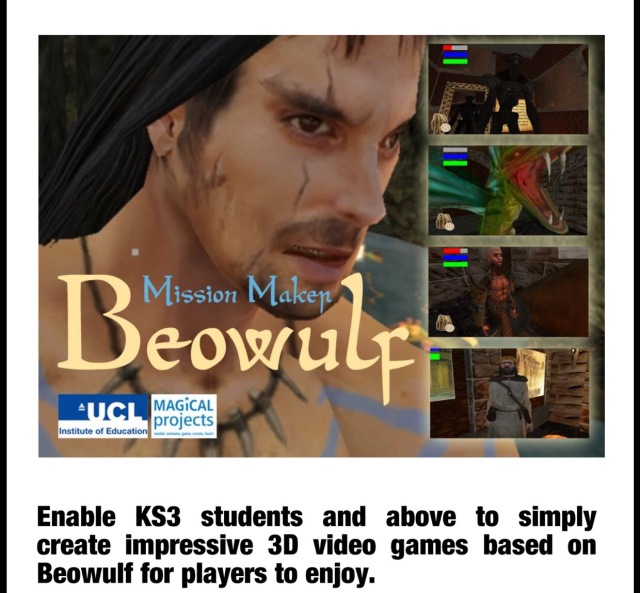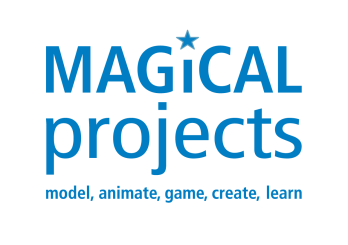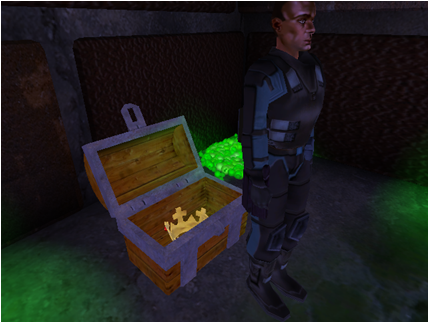Missionmaker is a game-authoring software tool for making 3D videogames quickly with no specialist programming knowledge. The current version was developed in a collaboration with the British Library, to enable users to make games based on Shakespeare’s Macbeth. It’s the latest in a series of projects I’ve led in this area, developed by the UCL enterprise MAGiCAL Projects, which I direct.
This project grew out of an earlier version, built in Unity during a research project funded by the Arts and Humanities Reseach Council to develop a new game- authoring tool for the Anglo-Saxon epic Beowulf. This collaboration between English, Media and Drama at the IOE with UCL Anglo-Saxon scholars, the British Library, the University of Sydney and Game City, Nottingham, explored how making game adaptations of literary texts can help students at all levels to understand and engage with literature in new ways.
THE NEW MACBETH MISSIONMAKER
This was developed with colleagues Jane Coles and Theo Bryer at UCL IOE, and Stella Wisdom, digital curator at the British Library. Also with colleagues in schools in London and Yorkshire, and PGCE English students at UCL. The teachers’ Introduction was written by James Durran, English Adviser for North Yorkshire.
The software was launched at the British Library on April 21, 2019. It was launched on Steam as a free early access software in May 2019, where it can be downloaded and reviewed.
A national competition was held by MAGiCAL for the best Macbeth video games made by schools, from February to May 2019. The games will be judged by a panel including leading figures from the RSC, the British Library, the Shakespeare Institute, and Cambridge University Press.
The software was developed by Abel Drew and Bruno de Paula for DDZ games, and funded by a UCL Higher Education Innovation Fund grant.
Here’s a video of demo game made with the software, showing the final conflict between Macbeth and Macduff from the point of view of one of the witches.
And here’s a video showing the process of making a Macbeth game.
THE BEOWULF MISSIONMAKER
The new tool was developed during the project. It was used by groups in schools, workshops at Game City, Nottingham, drama students in Sydney, and UCL Anglo-Saxon students to make a variety of games. Here’s a videocapture of a sample game using the current version of the software, about to be released for sale (Winter 2017).
And here’s a video capture of one made by two UCL students, in which the player takes the role of Grendel. It’s using an earlier prototype of the software.
The new tool is undergoing the final stages of development. Please contact me for further information, free trials, pricing, and research proposals.
Missionmaker is owned and developed by MAGiCAL Projects at UCL Institute of Education.
THE HISTORY
Missionmaker was developed originally in a project directed by David Buckingham and myself, with project researcher Caroline Pelletier and Immersive Education Ltd, a software company in Oxford. The project was funded by the PACCIT-Link programme: the programme evaluation, including a section on the Making Games project, can be found here.
The tool was designed to develop aspects of media education conceived of as forms of literacy: an understanding of game design through playing games, but also making them. This shift to an emphasis on the production of media texts was already growing in media education, but while it was easy enough to see how making films, radio programmes, newspapers and websites might work in the classroom, making games was more challenging, and had previously either depended on a grasp of programming, or on the use of game-making entertainment packages which offered little insight into how conditionality and procedural narratives were designed.
SHAKESPEARE GAMES
During and after the project, I found many occasions to work on game-design projects, especially with my colleague James Durran, formerly an Advanced Skills Teacher at Parkside Community College in Cambridge, now English Adviser for North Yorkshire. These projects included game design with a class, making a game based on Shakespeare’s The Tempest, and Playing Shakespeare, a collaborative project with Shakespeare’s Globe to develop a version of Missionmaker for young people to make games of Macbeth. The Arts and Humanities Research council funded this project under its Digital Transformations programme: their case study of it can be found here. The image below is a screengrab from a game level designed by two 13-year-old boys, called The Sewers of Lady Macbeth’s mind, in which the subterranean game-spaces become a psychological metaphor for the character.
And here is a video capture of the game level containing the murder of Duncan, made by two 12-year-old girls:
IMPACT AND LEGACY
The impact of the project and its legacy has been unusually extensive for an academic research project. Missionmaker was developed to commercial production by Immersive, and sold well in the UK, and was subsequently used in many classrooms, colleges and other learning sites. It has also been used in Australia, New Zealand, and several European countries. I have given keynote addresses about it in many countries also, developing the idea of game-literacy, and of game-authoring as a subset of the media arts in education. Articles and book chapters arising from this work can be found on the Games page on this site.
My own faculty, the UCL Institute of Education, used the project as an impact case study, submitted to the 2014 Research Evaluation Exercise. An early version of the case study, which documents the extensive afterlife of Missionmaker, can be found here.
The new Beowulf tool and Macbeth tool will add another chapter to this legacy. It is being considered for a second impact case study for the next REF.
MAGICAL PROJECTS
Towards the end of 2012, Immersive Education, who had been valued partners in these projects, fell victim to the recession, and the Institute of Education acquired their four educational software products, including Missionmaker. These are now being developed and traded under the name of MAGiCAL Projects (Model, Animate, Game, Create, Learn). We are working to develop in particular new versions of Missionmaker on the popular Unity engine. The first of these, recently trialled in schools, is ‘Missionmaker Core’, a version with extended programming functions, developed by MAGiCAL team Abel Drew and Bruno de Paula. This enables educators to teach fundamental principles of computing and programming, including Boolean logic, through satisfying 3-D game design. Our vision here is a marriage of computer science and the media arts – exactly the union at the heart of good game design studios, and a challenge to the persistent, damaging division between the Arts and Sciences noted in the last century by CP Snow. The interface for the alpha prototype new tool can be seen below, showing the use of different Boolean operators in constructing a game rule:
Anyone who would like to discuss collaboration over Missionmaker and games-authoring is welcome to contact me for further discussion.
EXAMPLES OF GAME-MAKING TUTORIALS USING THE ‘OLD’ MISSIONMAKER
Here’s one made by Classroom Multimedia, showing how to create a character and make it speak.
And here’s a very amusing one showing how to create trigger volumes – delivered by a talking cat! It was made by CMe Creative Media Studio, the student media production team at SKH Lam Woo Memorial secondary school in Hong Kong.




